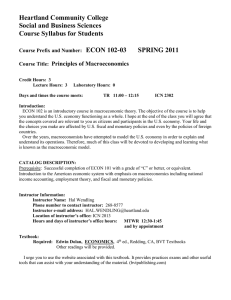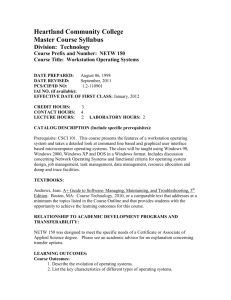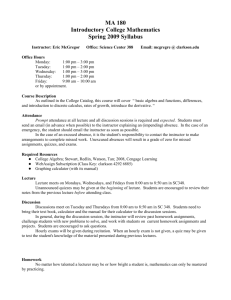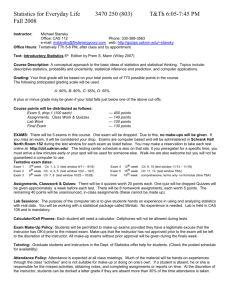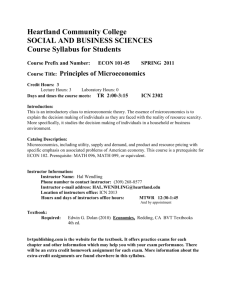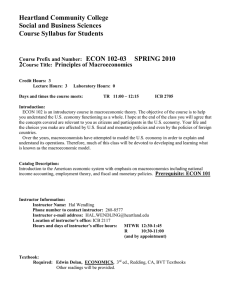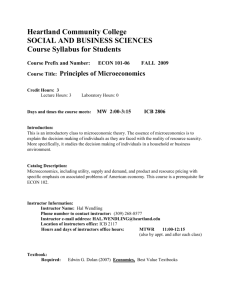ECON 102 01 WENDLING SP 13
advertisement
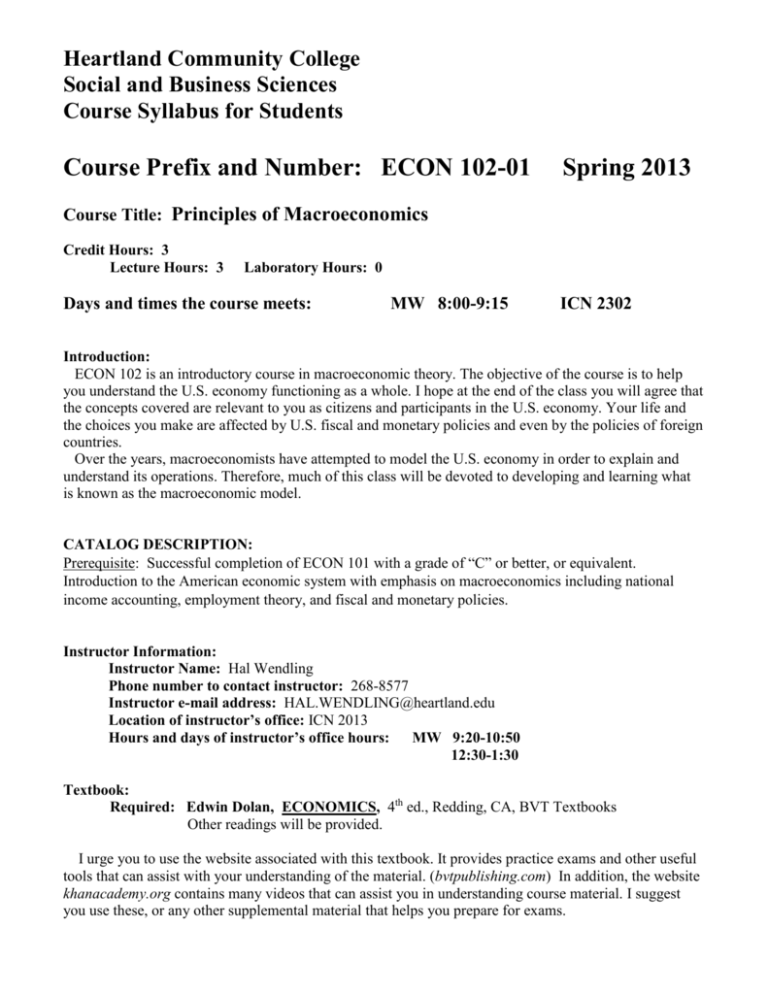
Heartland Community College Social and Business Sciences Course Syllabus for Students Course Prefix and Number: ECON 102-01 Spring 2013 Course Title: Principles of Macroeconomics Credit Hours: 3 Lecture Hours: 3 Laboratory Hours: 0 Days and times the course meets: MW 8:00-9:15 ICN 2302 Introduction: ECON 102 is an introductory course in macroeconomic theory. The objective of the course is to help you understand the U.S. economy functioning as a whole. I hope at the end of the class you will agree that the concepts covered are relevant to you as citizens and participants in the U.S. economy. Your life and the choices you make are affected by U.S. fiscal and monetary policies and even by the policies of foreign countries. Over the years, macroeconomists have attempted to model the U.S. economy in order to explain and understand its operations. Therefore, much of this class will be devoted to developing and learning what is known as the macroeconomic model. CATALOG DESCRIPTION: Prerequisite: Successful completion of ECON 101 with a grade of “C” or better, or equivalent. Introduction to the American economic system with emphasis on macroeconomics including national income accounting, employment theory, and fiscal and monetary policies. Instructor Information: Instructor Name: Hal Wendling Phone number to contact instructor: 268-8577 Instructor e-mail address: HAL.WENDLING@heartland.edu Location of instructor’s office: ICN 2013 Hours and days of instructor’s office hours: MW 9:20-10:50 12:30-1:30 Textbook: Required: Edwin Dolan, ECONOMICS, 4th ed., Redding, CA, BVT Textbooks Other readings will be provided. I urge you to use the website associated with this textbook. It provides practice exams and other useful tools that can assist with your understanding of the material. (bvtpublishing.com) In addition, the website khanacademy.org contains many videos that can assist you in understanding course material. I suggest you use these, or any other supplemental material that helps you prepare for exams. Relationship to Academic Development Programs and Transfer: (Indicate if course is General Education/IAI) This course fulfills 3 of the 9 semester hours of credit in Social Sciences required for the A.A. or A.S. degree. This course should transfer as part of the General Education Core Curriculum described in the Illinois Articulation Initiative to other Illinois colleges and universities participating in the IAI. However, students should consult an academic advisor for transfer information regarding particular institutions. Refer to the IAI web page at www.itransfer.org for more information. Beliefs: Academic Discipline: Economics. Student Learning: Responsibility shared with instructor. Instructor’s Role: My full-time job is helping you in the educational process. That means I am available to talk to you about this course or anything else that directly or indirectly concerns your education at Heartland. If you need help or have concerns that can’t be handled in class, then see me after class, during my office hours, or make an appointment. Don’t let yourself fall behind. COURSE OBJECTIVES (Learning Outcomes): Outcomes Demonstrate a knowledge of the concepts of scarcity, choice, and efficiency Demonstrate a knowledge of the role of the government in the U.S. economy Demonstrate an understanding of the measurements of inflation and unemployment Demonstrate a knowledge of the economic consequences of unemployment and inflation Demonstrate a knowledge of aggregate demand and aggregate supply, as well as U.S. fiscal policy Demonstrate a knowledge of fiscal policy and how it affects national employment and output. Explain some shortcomings associated with fiscal policy, and describe how fiscal policy impacts the federal deficit and international trade Demonstrate a knowledge of the U.S. banking system and monetary policy General Education Outcomes CT2 PS2 DI1 DI3 CT1 PS3 CO2 DI1 DI3 CT3 Range of Assessment Methods Writing Assignments, Exams, Quizzes, Discussion Writing Assignments, Exams, Quizzes, Discussion Writing Assignments, Exams, Quizzes, Discussion Writing Assignments, Exams, Quizzes, Discussion Writing Assignments, Exams, Quizzes, Discussion Writing Assignments, Exams, Quizzes, Discussion COURSE/LAB OUTLINE: The following topics are to be covered during the instructional process: I. II. III. IV. V. VI. VII. VIII. IX. X. XI. XII. Introduction to Economics A. The economizing problem B. The production possibilities curve C. Economic systems and planning D. The simple circular flow model Demand and Supply Economic Functions of the Government Measurement of Economic Performance A. Determinants of GDP Macro Economic Instabilities A. Unemployment and inflation Equilibrium Income and Employment (household, business and international sectors) Aggregate Demand and Supply Fiscal Policy US Money and Banking System Money Creation US Monetary Policy Exchange Rates and Balance of Payments HCC Portal Just a reminder that to access WebCT, IRIS, and your Heartland Student Email, you will need to log into myHeartland, at https://my.heartland.edu. Methods of Instruction: The class will primarily operate with a lecture/discussion format. These will be relatively heavy use of overheads and possibly some videos. Although class participation is not graded, student participation in questions and discussions is designed to prepare you for the exams. Whether you participate orally during class is up to you. Whether you participate mentally will play a significant part in your learning the material and thus, your grade. Method of Evaluation (Tests/Exams, Grading System): Exam #1 Exam #2 Exam #3 Exam #4 Final Paper TOTAL 100 points 90-100% =A 200 points 80-89% =B 200 points 70-79% =C 200 points 60-69% =D 250 points Below 60% = F 50 points 1000 points Part of some or all of the exams may be a written assignment. Participation and Attendance: Students are expected to attend all classes and participate meaningfully in the activities each class day. Absences will be penalized at the rate of 10 points each (after the first two absences). Tardies will be penalized at the rate of 5 points each (after the first tardy). (Remember: Class begins at 8:00, not 8:01.) Incompletes: Only given under extraordinary circumstances. This is solely at the discretion of the instructor according to Heartland Community College Guidelines. Cancelled classes: Cancelled class sessions, for all HCC classes, will be listed under Cancelled Class Meetings in the AZ Index in the Current Student page on the HCC website. See www.heartland.edu/classCancellations Make-up of tests and assignments: If you are excused from an exam, you have three options for make-up. Your choice of the options will be made as soon as possible once you are excused from the exam. Whatever your decision, it cannot be changed once made. It is solely the instructor’s decision whether your exam absence is excused, it is not simply an option. I will follow the student absence policies of the college in making my determination concerning the validity of your absence. 1) You may take your exam with my other section of 102. The test will be different, but it covers the same material and will be no more difficult (or easier) than the exam for this section. 2) You can take a comparable exam as soon as possible after you have been excused. Meet with me to make arrangements. 3) You can have the points for the excused exam added to the final exam. Required Writing and Reading: All written assignments are designed to enhance the student’s writing skills and critical thinking skills by analyzing concepts discussed in class. Students should read the required chapters, articles and reference material as indicated by the course calendar and assigned in class. Students are responsible for any and all material covered in class or in the readings. Student Conduct: Any form of cheating will not be tolerated. Lectures and class discussions may not be recorded. No eating or sleeping in class. Students are responsible for all readings and information presented in class. * Turn off your cell phone. Cell phones cannot be used as calculators for exams. * No lap top computers or other electronic devices (other than calculators) are allowed in class. * Each exam will have a time limit. If you’re late, you won’t be given extra time Penalties for violations will range from a verbal or written warning to dismissal from a class session or the course. Academic Integrity Academic integrity is a fundamental principle of collegial life at Heartland Community College and is essential to the credibility of the College’s educational programs. Moreover, because grading may be competitive, students who misrepresent their academic work violate the right of their fellow students. The College, therefore, views any act of academic dishonest as a serious offense requiring disciplinary measures, including course failure, suspension, and even expulsion from the College. In addition, an act of academic dishonesty may have unforeseen effects far beyond any officially imposed penalties. Syllabi disclaimer: You will be notified of any changes to this syllabus. If an exam or assignment is due during a class period when class is cancelled, the new exam or due date is the next scheduled class period. Date Chapters Covered Exam #1 W 1/30 1-3 (Review of basic economics) Exam #2 W 2/27 17-19 Exam #3 W 4/3 20-22 Exam #4 M 4/29 23-25 Paper M 5/6 (Due by the end of class, late not accepted) FINAL M 5/13 8:30am All of the above plus + class lecture What follows is the required weekly schedule (subject to change) The numbers on the right correspond to the text chapter being covered. Typically, there will be a fair amount of additional material presented in class that may not be fully covered in the book. Week 1 - Intro, 1 2 - 1,2 – econ problem, production possibilities, systems, circular flow, sup/dem 3 - 2,3 exam #1 4 - 17 – gov’t economic function, econ performance measurements 5 - 17,18 – GDP 6 - 18,19 - unemployment, inflation 7 - exam #2 – macro instabilities 8 - 20 – Income and employment 9 - Spring Break 10 - 20,21 – income and emp. continues 11 - 21,22 – AD/AS 12 - 22, exam #3 13 - 23 – fiscal policy 14 - 23,24 – money and banking 15 - 24,25 – money creation and policy 16 - exam #4, int’l trade, wrap-up, review 17 - paper due, review 18 - Final REQUIRED WRITING AND READING: This course requires approximately 30-40 pages of reading per week or 500 per semester. A minimum of 15 pages of college level writing is required in this course. Writing assignments includes a paper of approximately 7-8 pages, essay exams and various projects as deemed appropriate by the instructor.


